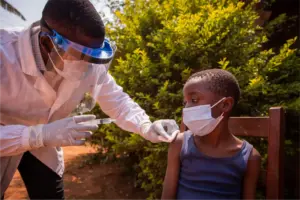
On December 18, 2024, the World Health Organization (WHO) achieved a pivotal milestone by prequalifying the first diagnostic test for glucose-6-phosphate dehydrogenase (G6PD) deficiency. This development marks a critical step in enhancing the safe administration of treatments for Plasmodium vivax (P. vivax) malaria, a relapsing form of malaria that affects millions annually.
This breakthrough follows closely on the heels of the prequalification of two tafenoquine products earlier in December, which were recommended in WHO’s updated malaria treatment guidelines released in late November. Together, these actions underscore WHO’s dedication to improving global health by streamlining access to essential health tools.
The new G6PD diagnostic test, manufactured by SD Biosensor, Inc., operates as a semi-quantitative, near-patient solution, capable of measuring G6PD enzyme activity in capillary or venous whole blood within minutes. Designed for use in both laboratory and non-laboratory settings, this device empowers clinicians with critical information needed to safely prescribe anti-relapse treatments, such as low- and high-dose primaquine or single-dose tafenoquine.
This innovation is particularly significant given the genetic nature of G6PD deficiency, a condition affecting over 500 million people globally. While most individuals with the deficiency remain asymptomatic, certain drugs used to prevent P. vivax malaria relapses can cause acute haemolysis—a severe destruction of red blood cells—if administered without proper testing. The absence of reliable G6PD diagnostic tools has historically limited the safe and widespread use of these effective therapies, posing challenges to malaria eradication efforts.
P. vivax malaria remains endemic in all WHO regions except Europe, with an estimated 9.2 million clinical cases reported in 2023. It is the predominant malaria parasite in regions outside sub-Saharan Africa, where access to timely and effective treatment is crucial for combating the disease.
Dr. Yukiko Nakatani, WHO Assistant Director-General for Access to Medicines and Health Products, highlighted the importance of this development: “The prequalification of this G6PD enzyme test enables countries to enhance access to much-needed quality-assured diagnostics, ensuring safer and more effective treatment for P. vivax malaria.” She further encouraged manufacturers to submit additional diagnostic products to expand global testing capabilities.
Dr. Daniel Ngamije Madandi, Director of WHO’s Global Malaria Programme, emphasized the broader implications of this advancement. “Wider availability of this test strengthens the global malaria response by reducing P. vivax relapses and onward transmission,” he said.
WHO’s synchronized processes for recommending health products and overseeing their prequalification aim to minimize delays in delivering essential health solutions to low- and middle-income countries. This initiative reflects the organization’s unwavering commitment to global health equity by expediting the availability of life-saving tools and treatments.
Stay informed on the latest advancements in global health by exploring more blogs, videos, and articles on our health portal.








